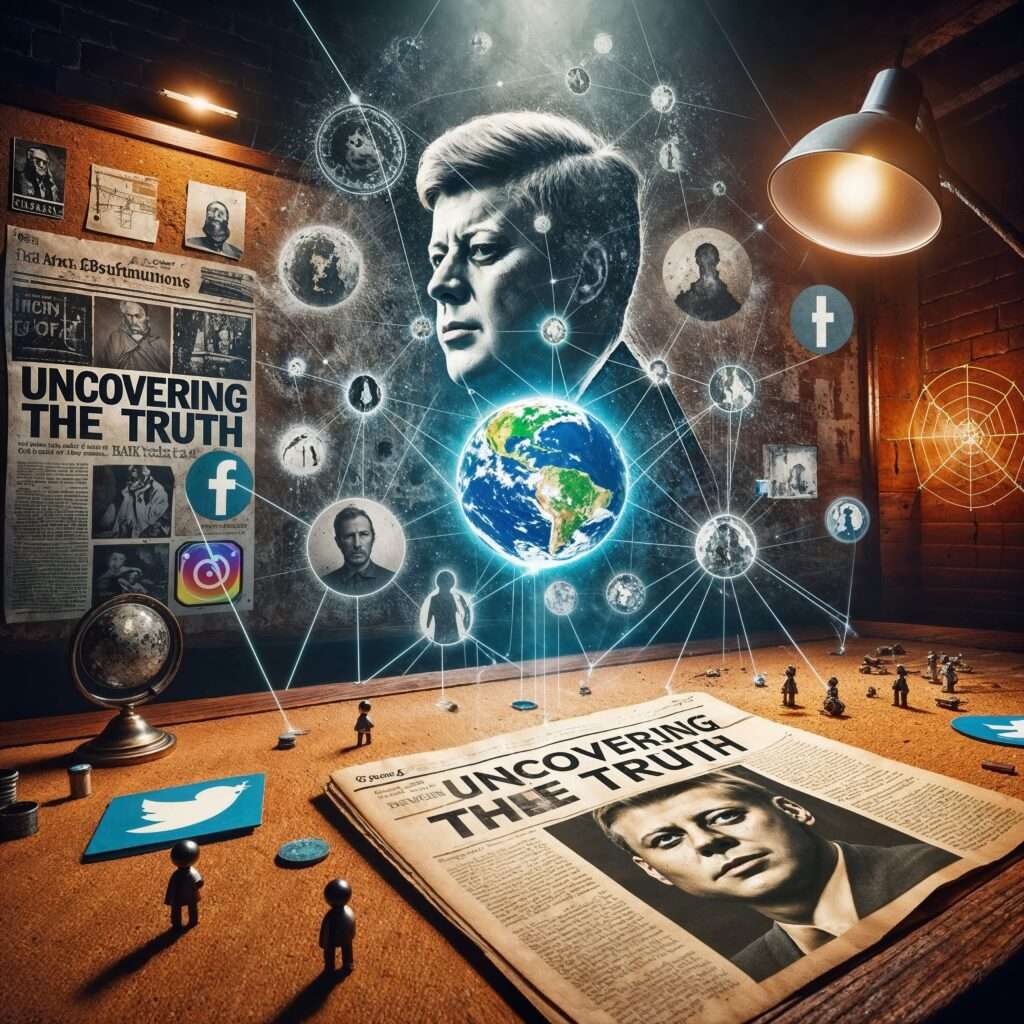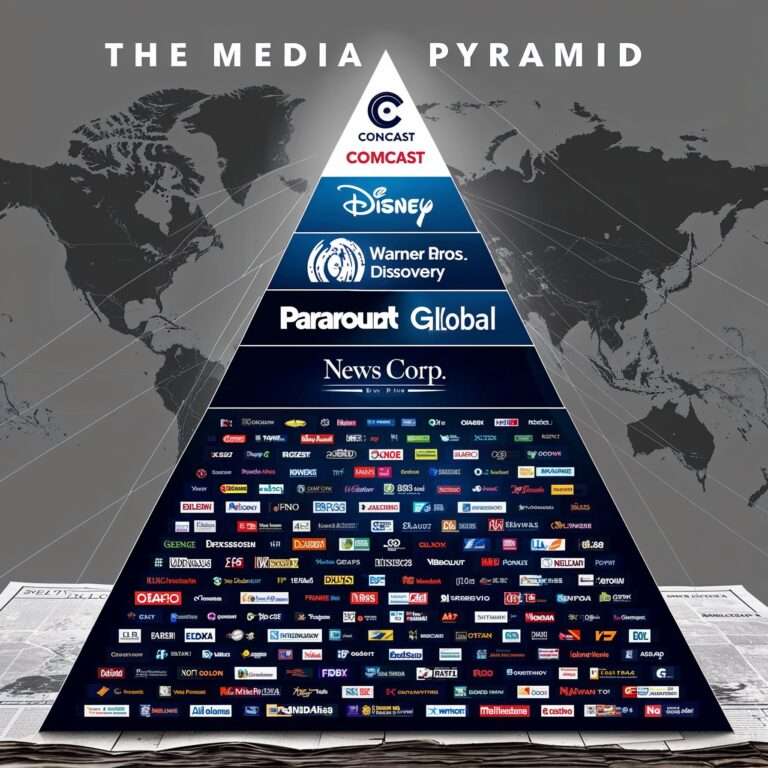
A visually captivating representation of conspiracy theories, blending elements like social media, Flat Earth symbolism, and iconic imagery, highlighting the intrigue and complexity of the subject.
In a world awash with information, the rise of conspiracy theories presents a unique challenge. With ideas traveling at the speed of a click, it can be difficult to discern truth from fiction. What’s dismissed as wild speculation today could be validated by evidence tomorrow, while seemingly credible claims might later unravel as falsehoods. Discernment—the ability to evaluate information critically and thoughtfully—has never been more essential. Conspiracy theories fact or fiction is often a question one might ask after reading into any theory.
The Bible reminds us of the importance of discernment in navigating truth and deception. Proverbs 14:15 states, “The simple believe anything, but the prudent give thought to their steps.” This verse highlights the value of careful thought and skepticism, especially in a time when misinformation can easily mislead.
This article explores conspiracy theories: fact or fiction, examining why discernment is vital, how misinformation spreads, and why some theories prove true while others fall apart.
What Are Conspiracy Theories?
Conspiracy theories propose that events or situations are orchestrated by powerful, hidden forces. While often dismissed as far-fetched, history shows that some conspiracy theories turn out to be true. Others, however, are grounded in misinformation or misinterpretation.
Examples of Conspiracy Theories
- True Conspiracies:
- Watergate Scandal: Once ridiculed, this theory exposed corruption in the Nixon administration.
- UAPs (Unidentified Aerial Phenomena): Government denials turned to admissions with recent disclosures, sparking new investigations.
- Tuskegee Syphilis Study: Allegations of unethical experimentation on African American men were tragically confirmed.
- Debunked Theories:
- Flat Earth Theory: Despite centuries of scientific evidence, some still claim the Earth is flat.
Moon Landing Hoax: Assertions that the moon landing was staged have been thoroughly disproven by overwhelming evidence.
Why People Believe
Conspiracy theories often gain traction in times of fear or uncertainty, offering explanations for events that seem random or complex. They appeal to the human desire for control, coherence, and understanding.
The Importance of Discernment
In a world of conflicting narratives, discernment is the foundation for distinguishing truth from misinformation. Without it, we risk falling prey to deception or dismissing legitimate concerns prematurely.
1. Understanding the Problem of Misinformation
Anyone can share information online, blurring the lines between credible sources and baseless speculation. Misinformation often arises from:
- Distorted Evidence: Facts taken out of context to fit a particular narrative.
- Emotional Manipulation: Stories designed to provoke fear, anger, or outrage, clouding judgment.
2. Avoiding Cognitive Pitfalls
Human psychology plays a significant role in susceptibility to conspiracy theories:
- Confirmation Bias: Seeking information that aligns with pre-existing beliefs while ignoring contradictory evidence.
- Proportionality Bias: Believing major events must have equally major causes, even when simpler explanations exist.
- Illusory Pattern Perception: Seeing connections where none exist.
1 Thessalonians 5:21 offers a biblical perspective: “Test everything; hold fast to what is good.” This verse reminds us to evaluate claims carefully and cling to what is truthful and beneficial.
3. Staying Open to Changing Evidence
What seems implausible today may be proven true tomorrow. A discerning mind balances healthy skepticism with an openness to new information.
- Example: UAPs, once dismissed as science fiction, are now a legitimate subject of government inquiry.
Conspiracy Theories That Turned Out to Be True
History provides a sobering reminder that some conspiracy theories, though initially ridiculed, were ultimately validated. These confirmed conspiracies fuel ongoing curiosity and skepticism, as they underscore how much remains hidden or undisclosed. Here are more examples of conspiracy theories that were proven true:
1. MKUltra (CIA Mind Control Experiments)
In the 1950s and 1960s, the CIA conducted a secret program called MKUltra, aimed at exploring mind control techniques.
- Claims: The government was experimenting with LSD and psychological manipulation on unwitting subjects.
- Truth: Declassified documents confirmed that the CIA conducted these experiments, often on individuals without their consent, including prisoners and hospital patients.
2. The Gulf of Tonkin Incident
The U.S. government claimed that North Vietnamese forces attacked U.S. ships in the Gulf of Tonkin, leading to America’s escalation in the Vietnam War.
- Claims: Some argued the incident was exaggerated or fabricated to justify military action.
- Truth: Declassified NSA documents revealed that the second attack, used as justification for war, likely never occurred.
3. The Iran-Contra Affair
In the 1980s, rumors swirled that the U.S. government was secretly selling arms to Iran and funneling the proceeds to Nicaraguan rebels (the Contras).
- Claims: Critics accused the Reagan administration of violating U.S. law and undermining international norms.
- Truth: Congressional investigations confirmed the existence of this secret operation, resulting in a major political scandal.
4. Big Tobacco’s Cover-Up
For decades, tobacco companies publicly denied that cigarettes were addictive or harmful.
- Claims: Whistleblowers suggested that companies knew about the dangers but deliberately misled the public.
- Truth: Internal documents revealed that tobacco companies were aware of the health risks and worked to suppress this information while marketing cigarettes aggressively.
5. COINTELPRO (FBI Surveillance of Activists)
The FBI’s Counterintelligence Program (COINTELPRO) targeted civil rights leaders, anti-war activists, and other dissidents from the 1950s to the 1970s.
- Claims: Activists alleged they were being illegally surveilled and harassed by the government.
- Truth: Documents obtained through the Freedom of Information Act confirmed that the FBI spied on, infiltrated, and attempted to discredit activist groups, including Martin Luther King Jr. and the Black Panther Party.
6. The Manhattan Project
During World War II, rumors circulated about a secret U.S. government project to develop a powerful new weapon.
- Claims: Conspiracy theorists believed the government was hiding groundbreaking technological advancements.
- Truth: The Manhattan Project was real and led to the creation of the atomic bomb, remaining a tightly guarded secret until its use on Hiroshima and Nagasaki.
7. The “Toxic Shock” of Agent Orange
During the Vietnam War, the U.S. military used Agent Orange as a defoliant to clear jungles, but rumors arose that it caused severe health problems.
- Claims: Veterans and local populations claimed exposure led to cancers, birth defects, and other illnesses.
- Truth: Scientific research and government admissions confirmed that Agent Orange contained dioxin, a highly toxic chemical linked to numerous health issues.
Why Proven Conspiracies Lead to Unanswered Questions
The fact that some conspiracy theories have been proven true feeds public skepticism and raises questions about what else might remain hidden. There are a few reasons why this dynamic persists:
1. Lack of Transparency
Governments and corporations often classify sensitive information, limiting public access to the truth. For example, decades after the JFK assassination, many files remain classified, fueling speculation about what they might reveal.
2. Ongoing Secrets and Redactions
When evidence emerges, it’s often incomplete, heavily redacted, or revealed years later, making it difficult to fully evaluate what happened. This delay fosters distrust and further conspiratorial thinking.
3. Historical Patterns
The repetition of proven conspiracies—whether government surveillance programs, unethical experiments, or covert operations—creates a historical pattern that reinforces the belief that many theories might have a kernel of truth.
4. The “Truth Gap”
Even when parts of a theory are validated, the unanswered questions often lead to new theories. For example:
The full truth behind the JFK assassination remains elusive, as critical documents remain classified despite public pressure to release them.
The Danger of False Conspiracy Theories
While some theories have merit, many are based on falsehoods or distortions, often causing harm:
1. Public Health Risks
Conspiracies surrounding vaccines, such as the debunked link to autism, have led to declining vaccination rates and the resurgence of preventable diseases.
2. Political Instability
Theories about election fraud or government coups can undermine trust in democratic institutions, fueling division and unrest.
3. Personal Consequences
Believing false conspiracy theories can isolate individuals from loved ones, damage reputations, and lead to harmful decisions.
How to Cultivate Discernment
Discernment is a skill that can be developed with intentional effort:
1. Question the Source
Reliable sources are transparent, credible, and accountable. Be cautious of anonymous claims or sources with clear biases.
2. Examine the Evidence
- Look for corroboration from multiple, independent sources.
- Evaluate whether the evidence is based on verifiable facts or speculation.
3. Understand the Motivation
Ask why the theory exists and who benefits from its spread. Some narratives are designed to manipulate emotions or promote agendas.
4. Stay Open but Skeptical
Discernment means striking a balance: being open to new ideas but skeptical enough to demand strong evidence.
5. Practice Media Literacy
Learn to identify fake news, understand how algorithms shape online content, and recognize biased reporting.
Navigating the Gray Areas
Not all conspiracy theories are entirely true or entirely false. Some combine factual elements with distortion, making discernment even more critical:
- Example: Theories about government surveillance were once dismissed as paranoia but gained credibility with Edward Snowden’s revelations. However, many such theories remain exaggerated or unsubstantiated.
By approaching such gray areas with care, we can avoid the extremes of blind belief or outright dismissal.
The Role of Faith in Discernment
Discernment is not just a practical skill but also a spiritual one. As Proverbs 2:6 teaches, “For the Lord gives wisdom; from His mouth come knowledge and understanding.” Seeking wisdom through prayer, reflection, and study equips us to navigate the complexities of the modern world.
Faith encourages humility, reminding us that we don’t have all the answers and must remain open to truth wherever it leads.
Conclusion
The line between fact and fiction in conspiracy theories is often blurred. While some theories uncover hidden truths, others distort reality or exploit our biases and fears. Discernment—anchored in critical thinking, humility, and openness to evidence—is essential for navigating this challenging landscape.
In today’s information age, where “what’s true today may be disproven tomorrow,” discernment is not just a skill but a safeguard against deception. By cultivating this gift, we can better understand the forces shaping our world and engage with them thoughtfully and responsibly.
Sources
In the article “Conspiracy Theories: Fact or Fiction? Why Discernment is Crucial in Today’s Information Age,” several sources provide valuable insights into the psychology behind conspiracy theories and examples of those that have been validated over time. Here are four key sources:
- “The Psychology of Conspiracy Theories” – Psychology Today
- This article explores cognitive biases, such as proportionality bias, that contribute to the belief in conspiracy theories. It discusses how individuals may seek grand explanations for significant events, influencing their acceptance of conspiratorial narratives.
- Read more on Psychology Today
- “11 Unbelievable Conspiracy Theories That Were Actually True” – HowStuffWorks
- This piece provides historical examples of conspiracy theories that were initially dismissed but later proven true, such as the Watergate scandal and the Tuskegee Syphilis Study. It highlights the importance of discernment in evaluating such claims.
- Learn more on HowStuffWorks
- “Why Some People Are Willing to Believe Conspiracy Theories” – American Psychological Association
- This article examines the personality traits and motivations that make individuals susceptible to believing in conspiracy theories, emphasizing the role of intuition, perceived threats, and a sense of superiority.
- Explore the findings on APA.org
- “6 Conspiracy Theories That Actually Turned Out to Be True” – Mental Floss
- This article discusses instances where conspiracy theories were validated, such as the U.S. government’s surveillance programs, underscoring the necessity of critical thinking and discernment.
- Read more on Mental Floss
These sources offer a comprehensive understanding of the complexities surrounding conspiracy theories and the essential role of discernment in distinguishing fact from fiction.
Further Reading on Paranoid Prophet
1. “Conspiracy Theories: Uncovering the Truth Behind the Myths”
This comprehensive category explores various conspiracy theories, their origins, and the psychology that fuels them. From classic theories to modern narratives shaped by social media, it provides an extensive look into the world of conspiracies.
Explore the Conspiracy Category
2. “Mainstream News Influence on Public Perception”
This article examines how mainstream media can shape or distort public perception, often leading to skepticism and fueling conspiracy theories. It provides insight into the interplay between media narratives and societal trust.
Read More on Mainstream News Influence
3. “JFK Assassination: Mossad, CIA, and a Nuclear Plot?”
This piece dives into the controversial theories surrounding the JFK assassination, including allegations of CIA and Mossad involvement. It explores the evidence, motivations, and unanswered questions behind one of history’s most enduring conspiracies.
Discover the JFK Assassination Theories
4. “The Appeal of Flat Earth Theory: Psychology, Social Media, and Biblical Interpretations”
This article investigates why the Flat Earth Theory persists despite overwhelming scientific evidence to the contrary. It examines the psychological appeal, the role of social media in spreading the theory, and the influence of biblical interpretations.
Learn About the Flat Earth Theory
These resources provide diverse perspectives on conspiracy theories, highlighting their psychological roots, historical examples, and societal impacts. Let me know if you’d like further refinements!
FAQ: Conspiracy Theories Fact or Fiction
General Questions
1. Why do some conspiracy theories turn out to be true?
Conspiracy theories sometimes reveal legitimate secrets or hidden activities when enough evidence emerges or documents are declassified. Often, these theories initially seem implausible but are later validated by whistleblowers, investigative journalism, or government disclosures.
2. How do confirmed conspiracy theories affect public trust?
When conspiracy theories are proven true, they can erode trust in institutions and authority figures, leading people to question other official narratives and sometimes believe unverified claims.
3. Why are some conspiracy theories dismissed for decades before being proven true?
Theories are often dismissed due to lack of evidence, active disinformation campaigns, or the implausibility of the claims at the time. Once new evidence emerges, these theories may be reevaluated.
Examples of Confirmed Conspiracy Theories
4. What are some other conspiracy theories that turned out to be true?
- MKUltra: The CIA’s illegal human experimentation program involving mind control techniques was revealed through declassified documents.
- The Gulf of Tonkin Incident: Events used to justify U.S. involvement in the Vietnam War were later admitted to be exaggerated or fabricated.
- Big Tobacco Cover-Up: Internal documents showed that tobacco companies were aware of the health risks of smoking but deliberately hid the information for decades.
- COINTELPRO: The FBI’s covert operation targeted activists, civil rights leaders, and political groups, violating civil liberties.
5. Why do true conspiracy theories lead to unanswered questions?
When a conspiracy theory is proven true, it often reveals previously hidden actions or motives, sparking curiosity about other potential cover-ups. The lack of transparency in government or corporate practices perpetuates unanswered questions and fuels further speculation.
Discernment and Public Impact
6. How can people discern between fact and fiction in conspiracy theories?
Discernment requires evaluating the credibility of sources, seeking corroborating evidence, and remaining open to new information while being cautious of emotional or sensational narratives.
7. What role does secrecy play in conspiracy theories?
Secrecy fosters speculation. The more information is withheld, the more people are inclined to fill gaps with theories, some of which may eventually prove accurate.


